
Queer-ness
I like the word queer. A lot of people don’t – I’m not saying that you should, just saying that I do. I like it because it’s broad, inclusive, a little in-your-face. I like the literal meaning. (and, personally, I find the term “bisexual” more than a little outdated.)
Closets
In 1987, at 16, I had a boyfriend and my first serious girlfriend. Looking at the historical record, this was a terrible time to come out. Personally, I couldn’t do anything else. I’m not made to be in the closet. There was no vocabulary for polyamory (the term wasn’t coined until 1992) yet, so it was all swept under being bi despite not so much being one of each. I got a lot of flack from well-meaning people about being confused, about it being a phase etc. I also (we also) got a lot of abuse at school, which was unsurprising but terrible. For many teenagers, especially trans teenagers, it’s still terrible.
It Gets Better project: “The It Gets Better Project’s mission is to communicate to lesbian, gay, bisexual and transgender youth around the world that it gets better, and to create and inspire the changes needed to make it better for them.”
I could say that I’ve stayed out of the closet since then, but that’s not entirely accurate. My family knows, my community knows, my friends are often (but far from always) queer themselves. However, most people assume I’m straight, marginally less so now that I say “partner”. Being out is coming out over and over again, every time I take a new job, have conversations with new people, etc. At work, it’s carefully casually mentioning my partners. The word “girlfriend” doesn’t help at all, but somehow “ex-girlfriend” does. It’s pride rings on my office wall or in my zoom background, that sort of thing.
Lifehacker, who is always worth a read, says “Coming out leads to acceptance. It shows people you’re a little unique, but still the awesome person they’ve always known. If more people can accept your differences, they can in others as well and that makes the world a little better for everyone.”
Number
For years I kept a Polyamory website, and once upon a time it was one of the best resources out there. I moved the key content from that site to Franklin’s More Than Two site years ago, and recommend it (and his book!) highly. He defines polyamory as:
“The fact of having simultaneous close emotional relationships with two or more other individuals, viewed as an alternative to monogamy, esp. in regard to matters of sexual fidelity; the custom or practice of engaging in multiple sexual relationships with the knowledge and consent of all partners concerned.”
Here is an Introduction to Polyamory I wrote in 2011 because Poly people needed something to hand their parents, friends, etc to read. In addition, here is an excellent Polyamory 101 written by Franklin & Cherie in 2003-2005.
If you want to know more about me, personally, and polyamory, read on.
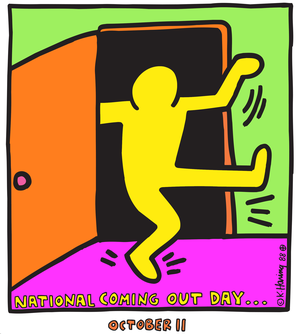
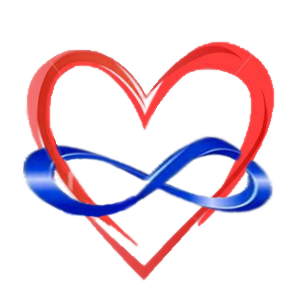


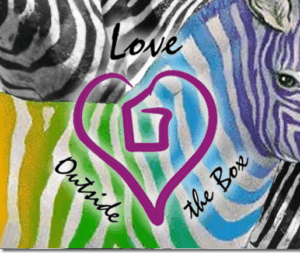
Poly Q&A
There are people who are monogamous, and there are people for whom monogamy is absolutely the best relationship style, and there are people who might be inclined towards having multiple partners but who can be happy being involved with one. I am not, and have never been, in any of those categories – I’ve been involved in multiple relationships from the get-go. So, I never had the experience of moving from monogamy to polyamory. Instead I read too much Heinlein (yeah, i know) as a kid, and my relationships were non-monogamous from the very beginning.
People ask me a lot of good questions about polyamory. Here are some of them, with my answers.
Q: Have you always had relationships like this?
A: Yes. I’ve been poly for as long as I have been involved with people romantically and sexually. (and yes, that’s a long time, i started young)
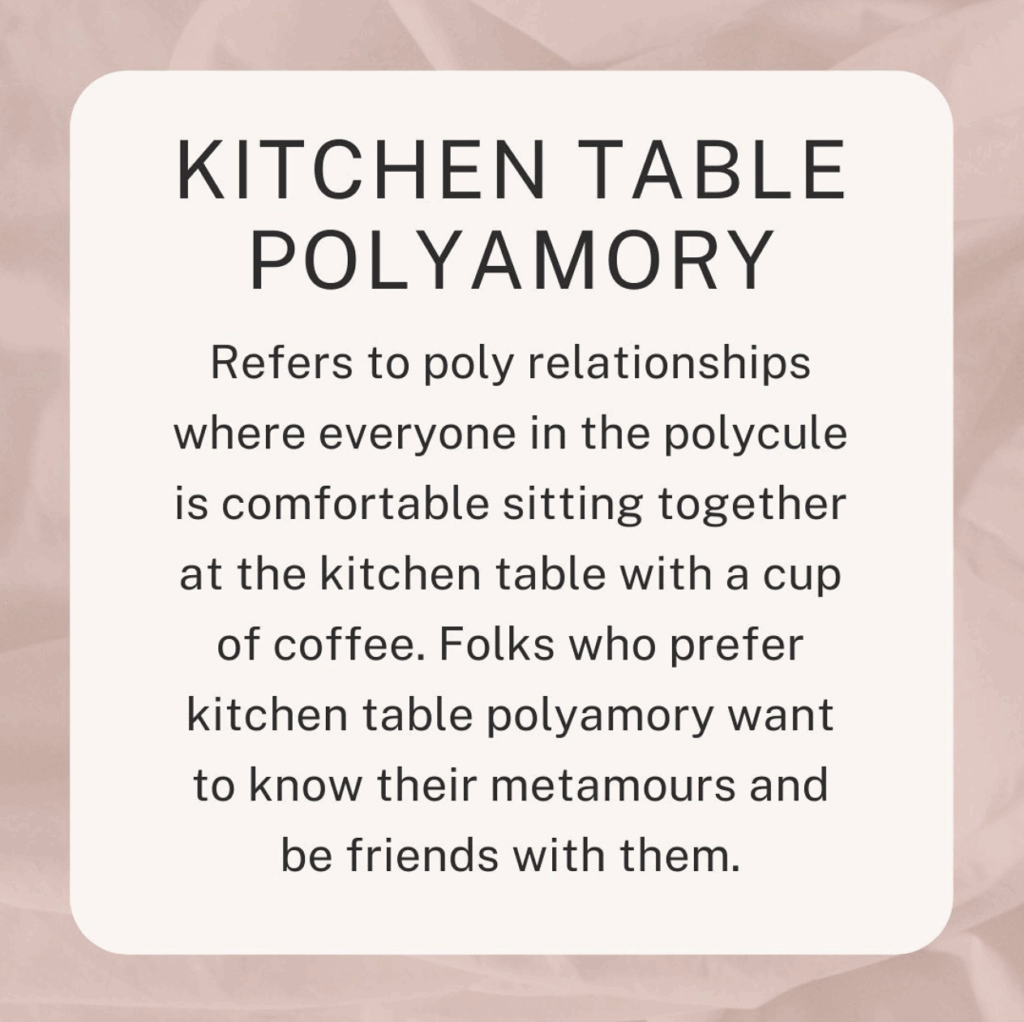
Q: How have you done it? / What kind of poly do you do?
A: There are a number of different “styles”, or “types” of polyamory (definitions).
I’ve never been polyfidelitous, though I have chosen at times to not add partners for different reasons. I’ve never been in a DADT (Don’t Ask Don’t Tell) relationship. I’ve never been a swinger, though that’s not a judgment on swingers (or on polyfi people, for that matter). I have been in a quad, I’ve been in a couple of triads (where all four/three people were involved with one another), but most often I’ve been in webs of Vees (where two people are involved with the same person but not involved with each other) aka a polycule.
I like the new term “Kitchen Table Poly” as a description as well!
Q: What about jealousy?
A: Jealousy is a tricky thing. One of the ways poly people think about jealousy is to treat it as a symptom rather than as a problem, the same way that you would treat anger or sadness. What is it that is making me sad or angry or jealous? What can I do to change that? It’s often not as straightforward as you think!
If I’m angry with my friend for being late, the solution may well be the obvious – for that person not to be late. But it might also be that my friend is just a late person! If the relationship with my friend is important to me, I need to learn a way to deal with her tardiness. I might tell her how much it upsets me, but I might also mentally add a half an hour to any time she says she’s going to be there. I might make a game out of it and always tell her to be someplace an hour before I need her. I might choose to meet her at a place where I won’t mind waiting, like a bookstore or a coffee shop. It’s not a perfect analogy, of course.
Q: What if you catch something?
A: There’s an interesting debate to be had about whether poly people (in multiple simultaneous relationships) are actually at any more risk of STDs and the like than monogamous people (in multiple sequential relationships). Regardless, yes, I pay a lot of attention to safer sex issues.
Q: Do your parents know?
A: Yes. (Since my mom lives with me these days, she better!) While I’m sure it’s not necessarily the path that they would have chosen for me, they understand that this is how and who we are. Any of my partners are welcome at family events. I came out to my parents when I was a teenager, before the term ‘polyamory’ was coined – it took as much if not more getting used to than my bisexuality, and I’m not sure at what point my mother admitted (will admit?) that it wasn’t a phase.
Q: Who else knows?
A: In my life, most everyone knows, and that’s super important to me. Someday I’ll add the stories of coming out at my various workplaces, and the occasional ensuing HR battles.
Q: Are all your friends poly?
A: No. Lots are, but I’m friends with, and related to, lots of people who are monogamous, too. I don’t think that polyamory is the right choice for everyone, and I don’t think that monogamy is the right choice for everyone.
Q: What are the rules? / Is anything ok?
A: In general, everyone needs to be honest and open, and everyone needs to abide by the agreements they have made. Each relationship, though, has different agreements. I also have my own set of rules, for myself, about who I get involved with. They serve as much as reminders of life lessons as hard and fast rules……
Groundrules & Life Lessons
Note: these are rules I made, for me. (Thus, not rules anyone else made for me, or that I made for anyone else)
Don’t go to bed with someone for the first time when they are drunk (or otherwise altered).
When people drink or are otherwise altered, they make different decisions than they would if they were sober. Sometimes that means they are willing to do things that they will regret later. Sometimes it means that they will do things that they will later feel they should not have or did not consent to. People remember things differently when they are altered. Why is this on my list? I’m never tempted to make the first move on someone who is fucked up, but I need to stop and think about it when someone who is fucked up makes the first move on me. This is especially true when it’s someone I have the hots for anyway. I’ve also been in a couple situations where people agreed, sober, that they wanted to do X – but then took a drink or a smoke to help them be ok with it. This is actually a pretty big turnoff to me, but it helps to have the ‘rule’ to fall back on and say “huh, I have a rule about that. talk to me again about it later.” (which is also true for adorable drunk people hitting on me, damnit!) This one also extrapolates out to “don’t do new things with existing partners when they are fucked up”, though after some conversation and consideration I think i’d be ok with it if it were clearly pre-negotiated.
Don’t get involved with people who don’t have a primary relationship or other stable support structure.
I’ve spent a lot of time talking about this rule on poly email lists because it pushes people’s buttons. Regardless, there are a couple of strong reasons for it. The first and more obvious one is that someone who doesn’t have a primary or other serious support structure is pretty likely to want more from me than I’m in a good space to give, given that I have a family that comes first. (Life lessons? oh yeah. both personally and in watching my partners get involved with people who then want more from them than is comfortable for my relationship with my partner. no fun.) The second is one I’ve only really figured out more recently, and this is the flip side. Even if someone who doesn’t have a primary relationship isn’t looking for one from me.. there’s sub-conscious stuff in me that wants to fill that space if it it is empty. This isn’t always a bad thing – I’ve had relationships develop into really good spaces because of it. But this is what my experience shows: If someone doesn’t have a primary* relationship already, and a good emotional connection exists between us, either or both sie and i are likely to (want to) move the relationship into that space. So the lesson to be learned here? Unless I’m ok with the potential of the relationship moving into that space,don’t go there. * That’s “primary” as relationship description, not “primary” as hierarchical designator – if that doesn’t make sense, remind me to write up what i’m talking about and add it to this site, ok? 🙂
Don’t get involved with someone if i can’t get along with their primary(s), or if they can’t get along with mine.
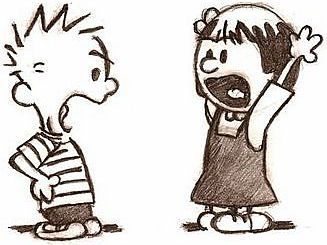
It’s important to me to be able to respect and support my partners’ primary relationships. This is much harder to do if I don’t like or can’t get along with the person in question. It also makes it really hard for me to share space with the person and hir partner, which is often awkward. Similarly, I need anyone I get involved with to be able to get along with the most important people in my life, which these days includes my kid as well as my partners. (Of course, if this were a more predictable dynamic, it would make my life a lot easier. but at least it’s a good place to start.)
Don’t get involved in cheating.
It’s very tempting to get involved in cheating. You have no agreements with this person’s partner to break. You’re not breaking any of your agreements with YOUR partners. Why not? To start with, I have a Thing about honesty. For folks who don’t know my history, this is in great part because I spent a long long time being fundamentally dishonest about my life to just about everyone. (it’s a long story) When I talk about honesty, I’m not just talking about not-lying. I’m also talking about not-being-dishonest, where dishonesty includes intent-to-deceive – omissions and half truths and all that. Which isn’t to say i never am dishonest – there are times when the pain that would be caused by full honesty outweighs the drive to be honest. But, I don’t ever make that call casually. Being honest also doesn’t preclude being tactful or gentle, though I understand that there are people who think I mostly fail at those. Not getting involved in cheating is partly about the honesty thing. Chances are good that getting involved in cheating will mean at some point having to be dishonest to someone about it — it’s the nature of the beast. But even more it’s about the karma — contributing to Bad Shit is just not a good idea. So.. No getting involved in cheating. Ever. Not even casually.
Don’t get involved with anyone who is in the closet, or who won’t acknowledge the relationship.
What does it mean (to me) to be in the closet? It means intentionally deceiving people about who the people most important to you are. Someone asked me recently if a woman who identified as het but was involved with me would count as being in the closet – the answer would be “it depends” – if she were hiding her involvement with me because of my gender? Yes. I had the experience once of being told that I ought not to kiss a lover at a party. If it had been ‘because this is a casual thing and i don’t want to confuse people’, it would have felt a lot different from ‘because of your gender’. Not a comfortable thing. Interestingly, my first experience with this was flipped – one of my first lovers (male) identified as gay, despite being involved with me. He was prone to saying things like “it doesn’t count if i’m pretending you’re a boy”, and generally denying that his relationship with me counted as being involved with a woman, for other similarly nonsensical reasons. (he did shift to identifying as bi a couple years later, surprising none of his friends)
For some wonderful writing on being out of the closet, look here.
Someone else asked, roughly how out of the closet i needed a lover to be. It’s essentially a minimum of the people we overlap with, and a fairly strong preference for no attempts to hide the relationship. I’ve also learned that not being able to meet a partner’s kids is very hard for me. (I should be clear here that even though the first couple examples are about gender preference, this is totally an issue for poly as well. And I’m including poly under ‘queer’, below.) There are three pretty highly charged emotional reasons for this. The least charged of the three is the “political” – I am strongly strongly in favor of people being out of the closet as the right thing to do for other queer people, even when it’s hard for them personally. I don’t feel like I need to impose this piece of my worldview on everyone around me, but it’s something I feel strongly enough about that a *partner* being in significantly different space on it is hard. The more emotionally charged stuff – honesty, and feeling like the people i’m involved with can be trusted to be honest, which is harder if they’re actively deceiving people about important stuff in their lives. And, shame. I’ve been in too many relationships where I felt like the person was ashamed to be involved with me. It sucks, and I don’t like it. Someone not acknowledging their relationship with me, for closet reasons or others, is pretty likely to push those buttons.
Don’t be someone’s experiment
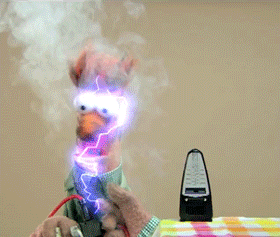
This is a rather hard-learned lesson, and one that I still seem to need to keep exploring (which may translate to “haven’t learned yet”, huh?). I’m still working out what level of ‘experiment’ is ok. Things I know.. getting involved with someone where I’m either the first woman or the first poly person they have been involved with is a terribly tricky thing, and has often led to grief. On the other hand, there are times when it’s worked out beautifully So what I look for here is.. how does it feel? Does it feel like this person is trying [poly/queer] on for size? Is this person getting involved with ME, or trying out the [poly/queer] thing? I have something of a history of people being attracted to me who are usually more/entirely attracted to men. (I assume that this has something to do with being somewhat genderqueer.) That is sometimes very positive, especially during. Sometimes after the fact this has had really nasty emotional repercussions for me. (Perhaps unsurprisingly, that set of people correlate reasonably well with people who have some degree of shame/hiding about the relationship, which is certainly not good for me.) So this one is pretty vague, and a tricky one.
Negotiate safer sex rules and stick to them.
This rule also includes “Negotiate with your clothes ON.”
I don’t think I have anything else to say about this rule, except that it’s utterly clear that I need to be involved with people who are at least roughly on the same page as I am on safer sex issues. (Sometimes I wonder if we’re even reading the same book!)

